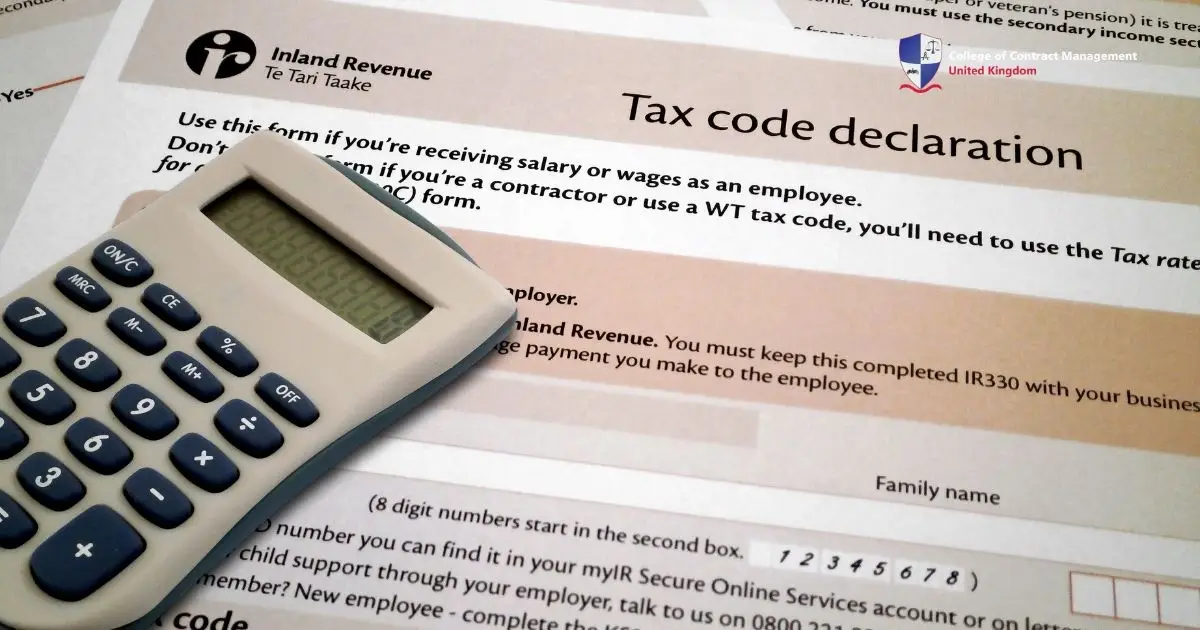Understanding what a tax code is is essential for anyone in the construction industry, including builders, contractors, and project managers. These codes directly impact your finances. They dictate how much tax you owe and which deductions or reliefs you can take advantage of. By grasping these details, you can make smarter financial decisions. In turn, this can help you save money in the long run, making your work more profitable.
Construction businesses handle tough financial deals. These include costs for labour, materials, and equipment. Tax codes show how these expenses are taxed. This impacts payroll and project profits. When you understand these codes, you can save money. Additionally, it helps you avoid penalties. Lastly, it allows you to invest in smarter ways. Overall, knowing the tax rules is very beneficial for your business.
What is a tax code, and why does it matter?
A tax code is a set of rules that helps you figure out how much tax you need to pay. It covers things like income limits, which expenses you can claim, and what rates apply. For businesses, especially in construction, tax codes play a big role in daily decisions. They affect how money is managed and what choices are made.
In the construction industry, tax codes include specific details about VAT on materials and relief for eco-friendly building practises. Additionally, there are capital allowances available for equipment. By grasping these details, businesses can stay compliant with the rules. Moreover, understanding these aspects can greatly enhance cash flow. So, it’s valuable to know how these tax codes work in practise.
Impact of a tax code on the construction industry
The construction industry faces specific tax challenges. Labour costs can be high. Equipment purchases add to the burden. Moreover, project timelines often change, creating financial difficulties. Thankfully, tax codes offer some help. They provide clear guidelines on how businesses can manage these challenges. These codes also offer potential relief for companies. Overall, understanding taxes is crucial for construction businesses to thrive.
For instance, businesses can save money on their taxes when they buy tools or vehicles. Also, certain projects, like building something new, might get lower VAT rates. Using the right tax codes is important. They can help businesses keep costs down and boost profits. This makes tax planning a key part of smart financial management. So, it’s worth paying attention to these details.
Common tax code mistakes in construction
Understanding tax codes can be tricky in construction. Many people struggle with this issue. It often leads to costly mistakes or even penalties. For example, misclassifying workers can cause serious problems. Additionally, failing to keep accurate records can hurt you financially. Consequently, it's important to be aware of these common pitfalls. By staying informed, you can avoid financial losses and ensure smoother operations.
- Incorrect worker classification: Not understanding the difference between employees and subcontractors affects payroll taxes and National Insurance contributions.
- Overlooking VAT benefits: Construction often qualifies for reduced VAT rates, especially for new builds or eco-friendly projects. Failing to apply these rates leads to overpayment.
- Failing to claim allowable expenses: Construction businesses can claim deductions on tools, safety gear, and even training courses. Missing these opportunities wastes money.
To avoid these common mistakes, it's important to understand the tax code. Regular financial reviews also help. By staying informed about the rules, you can make better decisions. Additionally, checking in on your finances often can highlight any issues early. This proactive approach keeps you on track and helps you avoid potential pitfalls. Overall, a little preparation goes a long way in managing your taxes effectively.
Tax deductions specific to construction
Tax deductions help construction businesses lower their taxable income. By knowing the tax code, companies can make the most of these benefits. For instance, deductions reduce the amount of income that is taxed. This means more money stays in the business. Additionally, understanding these deductions can lead to smarter financial decisions. Overall, taking advantage of tax deductions is crucial for saving money and improving profitability.
- Capital allowances: Claim deductions for tools, machinery, and vehicles used in construction.
- Work-related travel expenses: Deduct costs like fuel and transport for job sites.
- Training costs: Expanses for upskilling workers or fulfilling legal requirements may be deductible.
- Health and safety gear: Hard hats, boots, and other safety equipment can also be claimed.
These deductions help improve cash flow. They allow businesses to keep more money on hand. With better cash flow, it’s simpler to reinvest in the business. This means owners can put money back into growth and new projects. Furthermore, having extra cash makes it easier to handle unexpected expenses. Overall, these advantages create a more flexible financial situation for companies.
VAT rules and construction
Value-added tax (VAT) plays an important role in tax compliance for construction businesses. It’s essential to follow the tax code closely. The guidelines vary based on the type of project. Therefore, businesses must carefully apply VAT to ensure they are compliant. Staying informed about these rules is crucial. By doing so, construction firms can avoid potential issues and keep their operations running smoothly.
- New build: Often qualifies for a zero VAT rate, significantly reducing costs.
- Renovations: Reduced VAT rates may apply for specific projects like energy-efficient upgrades.
- Standard-rated projects: Most other construction work falls under the standard 20% VAT.
Understanding the right VAT rules can save construction businesses a lot of money. If you get these rules wrong, you might end up overpaying or facing penalties. It's essential to know the details. Therefore, take the time to learn about the regulations. This knowledge can really benefit your business in the long run. So, don’t overlook the importance of VAT compliance; it’s worth your effort.
Taxation of subcontractors
Subcontractors are important in construction. They help complete projects on time. However, dealing with a tax code can make payments tricky. This confusion can affect both contractors and subcontractors. Therefore, it’s essential to know the rules. By understanding these regulations, everyone can avoid issues down the line. Clear communication can also help smooth out any misunderstandings. In the end, staying informed benefits everyone involved.
The Construction Industry Scheme, or CIS, is a tax system for payments made to subcontractors. It sends these payments to HMRC. This helps everyone stay compliant with tax rules. However, it’s important to keep accurate records. You also need to understand how deductions work. By doing so, you can ensure everything runs smoothly and avoid any issues in the future.
Tax code updates and their implications
Tax codes change over time. They adapt to shifts in the economy and new laws. Because of this, construction businesses need to stay updated on these changes. It is essential for them to remain compliant with regulations. Additionally, keeping informed can help them seize new opportunities. By staying aware of tax updates, businesses can better manage their finances and plan for the future.
Recent changes in VAT rules for subcontractors and new tax reliefs for green building projects offer exciting opportunities. Staying informed is key, as it helps you save money and avoid surprises when it comes to liabilities. Therefore, it’s a good idea to keep up with these updates. Additionally, regular training or consulting with tax experts can really help you stay on track and understand the latest changes.
Importance of education in tax codes
Getting a grip on the tax code takes time. For those in construction, regular learning is key to handling tricky financial rules. Therefore, by putting money into specialised training, you can learn helpful information. This knowledge helps you make smart choices. Remember, staying updated can make a big difference. So, take the steps to gain the skills you need for success.
A great way to learn is by signing up for a course on tax codes related to construction. These courses offer practical tips and real-life examples. They go deeper than just the basics. You’ll gain useful knowledge that you can apply directly to your work. Plus, you’ll understand how tax codes affect the construction industry, which is vital for better planning and decision-making.
Courses offered by the College of Contract Management
The College of Contract Management is a top-notch institution that focuses on courses for the construction industry. We offer a variety of programmes that are relevant to today’s needs. For example, you can learn more about the tax code, explore digital marketing, and gain insights into construction practises. We aim to provide practical knowledge that you can apply directly in your career. Join us for a brighter future!
- Diploma in Construction Management: This course focuses on managing teams, finances, and compliance with tax codes in construction projects.
- CPD Course in Tax Management: A short course designed to help professionals understand tax codes, deductions, and compliance specific to the construction industry.
- NVQ Level 6 Diploma in Construction Contracting Operations Management: This course includes modules on financial management and tax codes, Ideal for those looking to enhance their leadership and operational skills.
These courses are great for building a strong understanding of tax codes. They help you learn how to use a tax code effectively in everyday situations. With simple lessons and clear examples, you’ll find it easier to grasp the concepts. Moreover, they break down complex ideas into bite-sized pieces, making them more manageable. In short, these courses give you the tools you need to handle tax matters confidently.
Conclusion
A tax code is a critical part of managing finances in the construction industry. From understanding deductions to staying compliant with VAT rules, having a clear grasp of tax codes can save money and reduce stress.
The College of Contract Management is the ideal partner for construction professionals who want to improve their skills and knowledge. Their courses are tailored to industry needs, making them an excellent choice for anyone looking to advance their career. Don’t let tax codes overwhelm you—take charge of your future by joining the College of Contract Management today!





